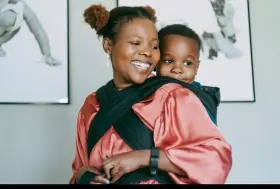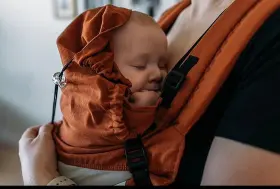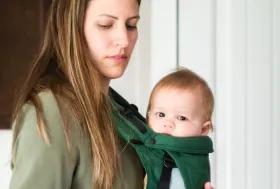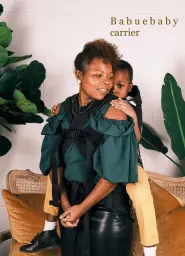Understanding Emotional Regulation:
At the heart of our children’s well-being lies emotional regulation—the ability to recognize, understand, and manage emotions in a healthy and constructive manner. Babywearing provides a nurturing and secure environment that encourages the development of emotional regulation skills from an early age.

When your child is held close to you in a carrier, they experience tactile, proprioceptive, and vestibular input. This means they feel the gentle touch and pressure from the carrier or wrap against their body (tactile input), they receive deep pressure and body awareness as they are snugly wrapped (proprioceptive input), and they experience gentle rocking and movement as you move with them (vestibular input). These sensory inputs have a calming effect on your baby’s/child’s nervous system, helping them regulate their emotions and reduce stress.
The Benefits of Babywearing:

a. Physical Proximity and Connection: Babywearing fosters a deep sense of physical closeness and connection between parent and child. When you wear your child, they feel your warmth, hear your heartbeat, and smell your familiar scent. This physical bond and closeness helps them feel safe and loved allowing children to explore and regulate their emotions in a safe and loving environment.
b. Regulation of Stress Responses: The gentle sway and rhythm experienced during babywearing can have a soothing and calming effect on neurodivergent children by aiding in sensory regulation. The sensory input provided by the movement and closeness of babywearing helps to stimulate the proprioceptive and vestibular systems, which are responsible for body awareness and balance. This stimulation can have a positive impact on a child’s overall sensory integration, promoting a sense of calm and reducing feelings of stress or anxiety. The rhythmic motion and close physical contact also provide a comforting and predictable sensory experience, which can further contribute to regulation which can be highly beneficial for their overall well-being and sensory integration.
Babywearing and Social Referencing

When your child is worn in a carrier on the front, they have continuous access to your facial expressions, vocalizations, and body language. They can observe and interpret these cues, developing their ability to understand and respond to emotional signals. This process is known as social referencing, where your baby learns to regulate their emotions by observing and imitating your emotional responses.
Babywearing and the Proprioception Sensory System

Babywearing can be beneficial for neurodivergent children as it provides a sensory experience that promotes grounding and helps calm the nervous system. When a child is securely wrapped or carried in a baby carrier, the gentle pressure and close physical contact create a cocoon-like environment. This sensation of containment and deep pressure touch can have a soothing effect on the child’s sensory system.
Babywearing and Oxytocin

The physical closeness and rhythmic movements associated with babywearing can also stimulate the release of oxytocin, often referred to as the “love hormone.” Oxytocin promotes feelings of relaxation, bonding, and trust, which can be particularly helpful for neurodivergent children who may experience heightened anxiety or sensory sensitivities
Babywearing and the Vestibular Sensory System

Furthermore, the consistent motion and gentle rocking that occur during babywearing mimic the familiar sensations a child felt in the womb. This familiarity and predictability can provide a sense of comfort and stability, helping to regulate the child’s nervous system and reduce stress or overstimulation.
In conclusion, while baby wearing with older kids is a powerful tool for nurturing emotional regulation, it’s important to remember that it’s just one method among many. There are other approaches that are equally beneficial. However, when combined with other effective parenting strategies, baby wearing can create a harmonious synergy, enhancing its impact on emotional growth. So, let’s explore various routes and methods, finding what works best for our unique families, and create a holistic approach to support our children’s emotional well-being. Together, we can build a foundation of love, understanding, and resilience.
Disclaimer: The information provided in this post is intended to offer general guidance and promote understanding of how babywearing can benefit neurodivergent children. However, every child is unique, and their individual needs may vary. It is essential to consult with an occupational therapist or therapist specializing in child development for personalized advice and guidance tailored to your child’s specific circumstances. They can provide a comprehensive assessment and recommend appropriate strategies to support your child’s well-being.
Written with Busi Musiiwa (Occupational Therapist)
Founder of Babuebaby

